ML Aggarwal Class 6 Solutions for ICSE Maths Chapter 4 Playing with Numbers Ex 4.5
Question 1.
Find the L.C.M. of the given numbers by prime factorisation method :
(i) 28, 98
(ii) 36, 40, 126
(iii) 108, 135, 162
(iv) 24, 28, 196.
Solution:
(i) Prime factorisation of the given numbers are:
28 = 2 × 2 × 7
98 = 2 × 7 × 7
Here 2 and 7 occurs as a prime factor maximum 2 times
∴ L.C.M. = 2 × 2 × 7 × 7 = 196
(ii) Prime factorisation of the given numbers are:
36 = 2 × 2 × 3 × 3
40 = 2 × 2 × 2 × 5
126 = 2 × 3 × 3 × 7
Notice that 2 occurs as a prime factor maximum 3 times, 3 two times, 5 one times and 7 one times
∴ L.C.M. = 2 × 2 × 2 × 3 × 3 × 5 × 7
= 2520
(iii) Prime factorisation of given umbers are
108 = 2 × 2 × 3 × 3 × 3
135 = 3 × 3 × 3 × 5
162 = 2 × 3 × 3 × 3 × 3
Notice that 2 occurs as a prime factor
maximum 2 times, 3, four time and 5, one time
∴ L.C.M.= 2 × 2 × 3 × 3 × 3 × 3 × 5 = 1620
(iv) Prime factorisation of the given numbers are
24 = 2 × 2 × 2 × 3
28 = 2 × 2 × 7
196 = 2 × 2 × 7 × 7
Notice that 2 occurs as a prime factor maximum 3 times, 3 one times, 7 two times
∴ L.C.M. = 2 × 2 × 2 × 3 × 7 × 7 = 1176
Question 2.
Find the L.C.M. of the given numbers by division method :
(i) 480, 672
(ii) 6, 8, 45
(iii) 24, 40, 84
(iv) 20, 36, 63, 67
Solution:
(i) 480, 672
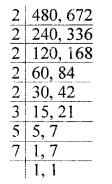
∴ L.C.M. = 2 × 2 × 2 × 2 × 2 × 3 × 5 × 7 = 3360
(ii) 6, 8, 45
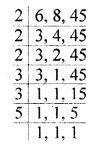
∴ LCM = 2 × 2 × 2 × 3 × 3 × 5 = 360
(iii) 24, 40, 84
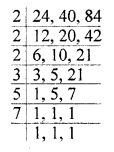
∴ LCM = 2 × 2 × 2 × 3 × 5 × 7 = 840
(iv) 20, 36, 63, 97
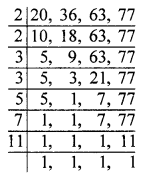
∴ L.C.M. = 2 × 2 × 3 × 3 × 5 × 7 × 11 = 13860
Question 3.
Find the least number which when increased by 15 is exactly divisible by 15, 35 and 48.
Solution:
First, we find the least number which is exactly divisible by the numbers 15, 35 and 48. For this, we find L.C.M. of 15, 35 and 48.
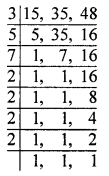
∴ L.C.M. = 3 × 5 × 7 × 2 × 2 × 2 × 2 = 1680
According to given condition, the required number will be 15 less than 1680.
∴ The required least number = 1680- 15 = 1665
Question 4.
Find the least number which when divided by 6, 15 and 18 leaves remainder 5 in each case.
Solution:
LCM of 6, 15 and 18

= 2 × 3 × 3 × 5 = 90
Hence, the required number is 90 + 5 i.e. 95 48
Question 5.
Find the least number which when divided by 24, 36, 45 and 54 leaves a remainder of 3 in each case.
Solution:
24, 36, 45 and 54
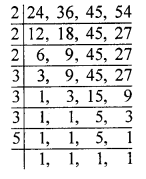
∴ L.C.M. = 2 × 2 × 2 × 3 × 3 × 3 × 5 = 1080
According to given condition, the required number will be 3 more than 1080.
∴ The required number = 1080 + 3 = 1083
Question 6.
Find the greatest 3-digit number which is exactly divisible by 8, 20 and 24.
Solution:
First, we find the LCM of 8, 20 and 24
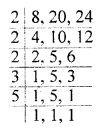
∴ LCM of given numbers = 2 × 2 × 2 × 3 × 5 = 120
Greatest number of 3 digit is 999
We divide 999 by 120 and find the remainder.

According to given condition, we need a greatest 3-digit number which is exactly divisible by 120.
∴ The required number = 999 – 39 = 960
Question 7.
Find the smallest 4-digit number which is exactly divisible by 32, 36 and 48.
Solution:
First, we find the LCM of 32, 36 and 48
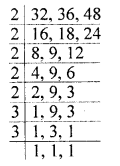
∴ LCM of given number
= 2 × 2 × 2 × 2 × 2 × 3 × 3 = 288
Smallest number of 4-digit = 1000
We divide 1000 by 288 and find the remainder

According to given condition, we need a least number of 4-digit which is exactly divisible by 288.
∴ The required number = 1000 + (288 – 136) = 1152
Question 8.
Find the greatest 4-digit number which is exactly divisible by each of 8, 12 and 20.
Solution:
First, we find the LCM of 8, 12 and 20

∴ LCM of given numbers = 2 × 2 × 2 × 3 × 5 = 120
According to given condition, we need a greatest number of 4-digit which is exactly divisible by 120.
Greatest number of 4-digit = 9999
We divide 9999 by 120 and find the remainder
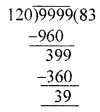
∴ The required number = 9999 – 39 = 9960
Question 9.
Find the least number of five digits which is exactly divisible by 32, 36 and 45.
Solution:
First we, find the LCM of 32, 36 and 45
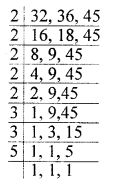
∴ LCM of given numbers
= 2 × 2 × 2 × 2 × 2 × 3 × 3 × 5 = 1440
Smallest 5-digit number = 10000
We divided 10000 by 1440 and find the remainder

According to given condition,
We need a least 5-digit number which is exactly divisible by 1440
The required number
= 10000 + 1440 – 1360
= 10080
Question 10.
Three boys step off together from the same spot. Their steps measure 63 cm, 70 cm and 77 cm respectively. What is the minimum distance each should cover so that all can cover the same distance in complete steps?
Solution:
The L.C.M. of 63, 70 and 77

⇒ 63 = 3 × 3 × 7
70 = 2 × 5 × 7
77 = 7 × 11
∴ L.C.M. = 3 × 3 × 2 × 5 × 7 × 11 = 6930
∴ The minimum distance each shall cover is 6930 cm i.e. 69 m 30 cm
Question 11.
Traffic lights at three different road crossing change after 48 seconds, 72 seconds and 108 seconds respectively. At what time will they change together again if they change simultaneously at 7 A.M.?
Solution:
LCM of 48, 72 and 108
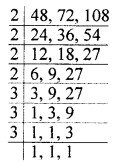
= 2 × 2 × 2 × 2 × 3 × 3 × 3 = 432
432 seconds = 7 minutes 12 seconds past 7 A.M.
Question 12.
If the product of two numbers is 4032 and their HCF is 12, find their LCM.
Solution:
Product of two number = 4032
H.C.F = 12
L.C.M = 4032 ÷ 12 = 336
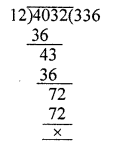
Question 13.
The HCF and LCM of two numbers are 9 and 270 respectively. If one of the numbers is 45, find the other number.
Solution:
HCF × LCM = one number × 2nd number
9 × 270 = 45 × 2nd number.
2430 = 45 × 2nd number
2430 = 45 × 2nd number
\(=\frac{2430}{45}=\frac{162}{3}=54\)
∴ 54 is other number.
Question 14.
Find the HCF of 180 and 336. Hence, find their LCM.
Solution:
Division method: HCF of 180 and 336
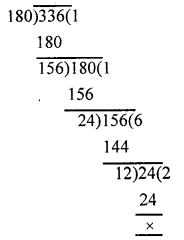
∴ H.C.R of 180 and 336 = 12
Products of numbers LCM of 180 and 336= \(\frac{\text { Products of numbers }}{\text { their H.C.F. }}\)
\(=\frac{180 \times 336}{12}=15 \times 336=5040\)
Question 15.
Can two numbers have 15 as their HCF and 110 as their LCM? Give reason to justify your answer.
Solution:
On dividing 110 by 15, we get

7 as quotient and 5 as remainder
We find that the remainder ≠ 0
So 110 is not exactly divisible by 15
∴ HCF and L.C.M. of two numbers cannot be 15 and 110 respectively.
As LCM of two numbers is always exactly divisible by their HCF.